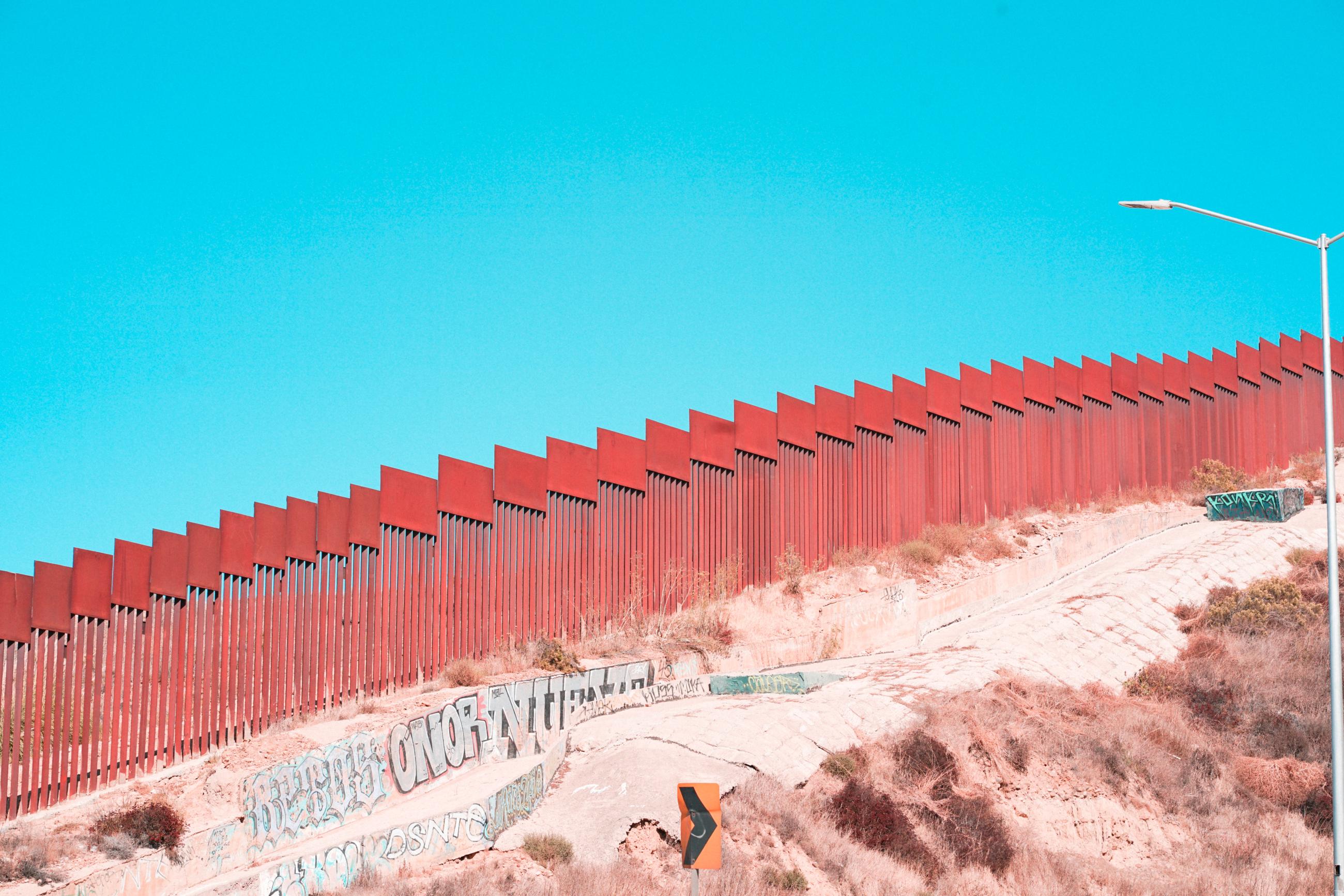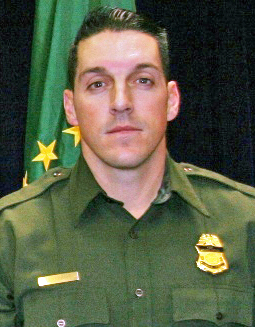Seventh Suspect Sentenced in the Killing of Border Patrol Agent Brian Terry
The legacy of Obama's 'Fast and Furious' continues.

US/Mexico border wall. Credit: Barbara Zandoval, Unsplash license.
Having served in U.S. Marine Corps, I have been closely following the story of Brian Terry, a fellow Marine and fallen United States Border Patrol Agent, which has been basically buried by legacy media once Barack Obama’s Department of Justice was found trying to arm Mexican drug cartels and blame border state gun stores.
This came all the while that administration was trying outlaw semi-automatic, center-fire firearms: the popular self-defense tools Democrats call "assault weapons.”
In recent news, a suspect in the killing of the U.S. Border Patrol Agent received a prison sentence.
Let's explore the details of the incident with the lens of wrongful death personal injury attorneys.
"Fast and Furious" Results in the Death of Border Patrol Agent Brian Terry
On December 14, 2010, Border Patrol agent Brian Terry became a victim of the "Fast and Furious" gunrunning operation, which tracked 2,000 weapons purchased in American gun stores and intended for drug cartels that went wrong. Only about 700 weapons were recovered.
Letting guns walk was a tactic used by the U.S. Attorney's Office and the Field Office of the Bureau of Alcohol, Tobacco, Firearms and Explosives (ATF) in Arizona to run sting operations between 2006 and 2011 in Tucson and Phoenix where the federal government purposely allowed licensed firearms dealers to sell weapons to illegal straw buyers.
The operation was done in the hope of following the guns to Mexican narcoterrorists, and then arrest them.
Within the ATF, the operation was called Project Gunrunner, and supposedly intended to interdict the straw purchasers and gun traffickers in the US. It became dubbed Fast and Furious after federal agents discovered that some of the suspects belonged to a car club.
One of the stated goals of the operation was to track the straw buyers to higher-ups in the Mexican drug cartels. However, none of these have been arrested.
Four Suspects Flee after an Intense Shootout Leads to Terry's Death
On the night of December 14, 2010, Manuel Osorio-Arellanes and four fellow Mexican criminals had decided to rob drug smugglers of marijuana when they encountered Border Patrol agents, who included Brian Terry. A gun battle ensued, and Terry was shot to death.

Osorio-Arellanes was shot in the stomach in the intense shoot-out, while his four accomplices fled to Mexico. During the battle, one armed robber shot Terry in the spinal cord, who screamed to a fellow agent just before his death.
Border Patrol agents arrested Osorio-Arellanes, who eventually pleaded guilty to one count of murder. He made a deal with the prosecutors to forego a death sentence in exchange for cooperating with the authorities to identify the remaining members of his crew. Osorio-Arellanes received a 30-year sentence in prison for his cooperation.
Mexican Authorities Make Arrests Leading to Extradition
The Mexican government arrested the remaining four robbers: Ivan Soto-Barraza, Leonel Sanchez-Meza, Heraclio Osorio-Arellanes, and Jesus Rosario Favela-Astorga, as suspects in the marijuana heist that occurred on the night Terry died. The United States petitioned Mexico for extradition for their trial on American soil.
Soto-Barraza and Sanchez-Meza were extradited in 2014, convicted in December 2015, and sentenced to life imprisonment. By 2018, Mexico deported Osorio-Arellanes, who was tried in February 2019 and also sentenced to life imprisonment.
Following the extradition of the above three crew members, authorities arrested Rosario Rafael Burboa-Alvarez, who was sentenced to 324 months imprisonment sentence for recruiting the crew members.
Two days before the incident, Border Patrol arrested Rito Osorio-Arellanes over immigration charges, later finding that he was also part of the robbery. He pleaded guilty and received a 96 months prison sentence for conspiracy to interfere.
Favela Astorga, Final Suspect in the Murder, Pleads Guilty
By January 2020, US officials had the final member of the robbery crew, Jesus Rosario Favela-Astorga, extradited.
Favela-Astorga pleaded guilty in the Southern District of California and, on September 21, 2022, received a sentence of 50 years in prison for the murder of Border Patrol Agent Terry. Favela-Astorga was the seventh and final defendant in the long-standing case.
For the past decade, the FBI, with the help of the US Border Patrol, the Department of Justice, and other government agencies, worked together to investigate the case and deliver justice.
Chris Ormerod, a federal agent in charge of the FBI Phoenix Field Office, stated that US officials hoped the final sentence would bring relief to Agent Terry's family. Acting Special Agent Ormerod reiterated his department's resolve to hold and punish those accountable for violent actions.
Upon the verdict, US Attorney Randy S. Grossman of the Southern District of California said, “Today is for Brian Terry, and his loved ones and colleagues who waited eleven years to see justice come to all who were involved in his tragic murder.”
“We hope it fulfills the promise to everyone who protects us. We’ll relentlessly pursue justice against those who do them harm for as long as it takes,” Grossman said, while thanking prosecutors, FBI, and the U.S. Border Patrol for their work.
Officials Face Criticism over the Controversial "Fast and Furious"
"Fast and Furious" became a massive controversy that exposed the dangerous tactics used by the federal department. The Obama administration faced much criticism over the operation, and former Attorney General Holder refused to hand over documents requested by Congress related to "Fast and Furious."
During the mission, federal agents allowed criminals to transfer weapons to drug cartels in a bid to make a big bust. The guns found at the scene of Terry's death were also those given to criminals during the operation. At the time, the Border Patrol Tactical Unit was unaware of the mission.
A report released by the Department of Justice in September 2012 revealed the misguided strategies, management failures, and other severe errors in the "Fast and Furious" operation. It referred 12 official names to DOJ officials for further discipline or administrative action.
The grieving parents of Border Patrol Agent Terry pursued a $25 million wrongful death suit against federal prosecutors, the Bureau of Alcohol, Tobacco and Firearms (ATF), and a local gunshop, which federal District Judge David G. Campbell dismissed in 2013.
Judge Campbell stated in an eight-page ruling:
“The Court recognizes that Plaintiffs have suffered a great loss, and that any financial remedy is likely insufficient to redress their injury.”
“But as the Supreme Court has made clear, the bedrock principle of separation of powers counsels against judicially-created remedies when Congress has established a remedial scheme,” he wrote.
Terry’s cousin, Robert Heyer – who chaired a foundation established in Terry’s name, expressed disappointment with the ruling. He believed that the federal judge had ruled strictly on a legal technically and had not considered the basis of the family’s claim that the ATF and U.S. Attorney had exposed federal officers to danger when they pursued the botched gunrunning operation.
Heyer said at the time that the family’s goal was to hold the ATF and prosecutors accountable rather than reaching a financial compensation.
Attorney Michael Ehline is an inactive U.S. Marine, who practices personal injury law claims in Los Angeles and other California cities. See: EhlineLaw.com